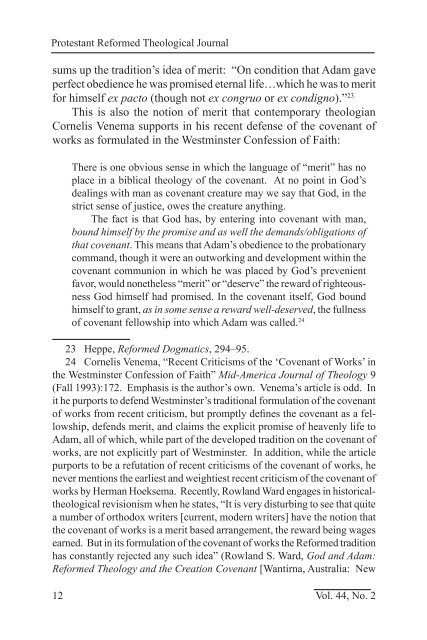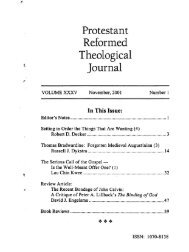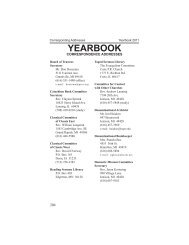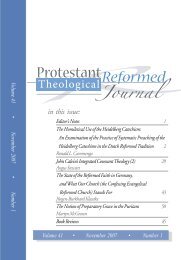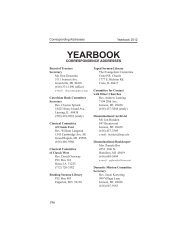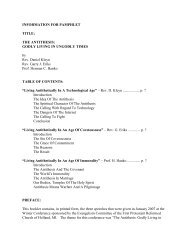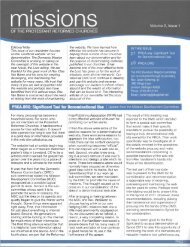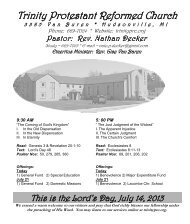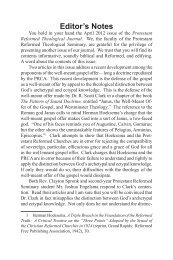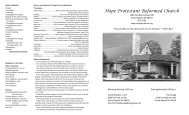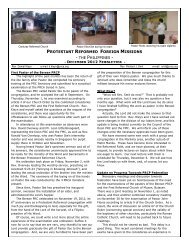A Critique of the Covenant of Works in Contemporary Controversy
A Critique of the Covenant of Works in Contemporary Controversy
A Critique of the Covenant of Works in Contemporary Controversy
Create successful ePaper yourself
Turn your PDF publications into a flip-book with our unique Google optimized e-Paper software.
Protestant Reformed Theological Journal<br />
sums up <strong>the</strong> tradition’s idea <strong>of</strong> merit: “On condition that Adam gave<br />
perfect obedience he was promised eternal life…which he was to merit<br />
for himself ex pacto (though not ex congruo or ex condigno).” 23<br />
This is also <strong>the</strong> notion <strong>of</strong> merit that contemporary <strong>the</strong>ologian<br />
Cornelis Venema supports <strong>in</strong> his recent defense <strong>of</strong> <strong>the</strong> covenant <strong>of</strong><br />
works as formulated <strong>in</strong> <strong>the</strong> Westm<strong>in</strong>ster Confession <strong>of</strong> Faith:<br />
There is one obvious sense <strong>in</strong> which <strong>the</strong> language <strong>of</strong> “merit” has no<br />
place <strong>in</strong> a biblical <strong>the</strong>ology <strong>of</strong> <strong>the</strong> covenant. At no po<strong>in</strong>t <strong>in</strong> God’s<br />
deal<strong>in</strong>gs with man as covenant creature may we say that God, <strong>in</strong> <strong>the</strong><br />
strict sense <strong>of</strong> justice, owes <strong>the</strong> creature anyth<strong>in</strong>g.<br />
The fact is that God has, by enter<strong>in</strong>g <strong>in</strong>to covenant with man,<br />
bound himself by <strong>the</strong> promise and as well <strong>the</strong> demands/obligations <strong>of</strong><br />
that covenant. This means that Adam’s obedience to <strong>the</strong> probationary<br />
command, though it were an outwork<strong>in</strong>g and development with<strong>in</strong> <strong>the</strong><br />
covenant communion <strong>in</strong> which he was placed by God’s prevenient<br />
favor, would none<strong>the</strong>less “merit” or “deserve” <strong>the</strong> reward <strong>of</strong> righteousness<br />
God himself had promised. In <strong>the</strong> covenant itself, God bound<br />
himself to grant, as <strong>in</strong> some sense a reward well-deserved, <strong>the</strong> fullness<br />
<strong>of</strong> covenant fellowship <strong>in</strong>to which Adam was called. 24<br />
23 Heppe, Reformed Dogmatics, 294–95.<br />
24 Cornelis Venema, “Recent Criticisms <strong>of</strong> <strong>the</strong> ‘<strong>Covenant</strong> <strong>of</strong> <strong>Works</strong>’ <strong>in</strong><br />
<strong>the</strong> Westm<strong>in</strong>ster Confession <strong>of</strong> Faith” Mid-America Journal <strong>of</strong> Theology 9<br />
(Fall 1993):172. Emphasis is <strong>the</strong> author’s own. Venema’s article is odd. In<br />
it he purports to defend Westm<strong>in</strong>ster’s traditional formulation <strong>of</strong> <strong>the</strong> covenant<br />
<strong>of</strong> works from recent criticism, but promptly def<strong>in</strong>es <strong>the</strong> covenant as a fellowship,<br />
defends merit, and claims <strong>the</strong> explicit promise <strong>of</strong> heavenly life to<br />
Adam, all <strong>of</strong> which, while part <strong>of</strong> <strong>the</strong> developed tradition on <strong>the</strong> covenant <strong>of</strong><br />
works, are not explicitly part <strong>of</strong> Westm<strong>in</strong>ster. In addition, while <strong>the</strong> article<br />
purports to be a refutation <strong>of</strong> recent criticisms <strong>of</strong> <strong>the</strong> covenant <strong>of</strong> works, he<br />
never mentions <strong>the</strong> earliest and weightiest recent criticism <strong>of</strong> <strong>the</strong> covenant <strong>of</strong><br />
works by Herman Hoeksema. Recently, Rowland Ward engages <strong>in</strong> historical<strong>the</strong>ological<br />
revisionism when he states, “It is very disturb<strong>in</strong>g to see that quite<br />
a number <strong>of</strong> orthodox writers [current, modern writers] have <strong>the</strong> notion that<br />
<strong>the</strong> covenant <strong>of</strong> works is a merit based arrangement, <strong>the</strong> reward be<strong>in</strong>g wages<br />
earned. But <strong>in</strong> its formulation <strong>of</strong> <strong>the</strong> covenant <strong>of</strong> works <strong>the</strong> Reformed tradition<br />
has constantly rejected any such idea” (Rowland S. Ward, God and Adam:<br />
Reformed Theology and <strong>the</strong> Creation <strong>Covenant</strong> [Wantirna, Australia: New<br />
12<br />
Vol. 44, No. 2


